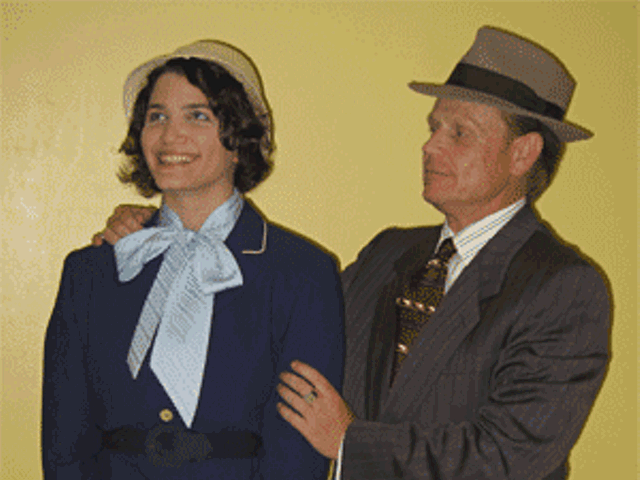In this St. Louis Shakespeare production, Patrick Huber's set provides the elegant elements necessary for the telling of the tales: a grand door, heavens for the gods' abode, a pool of water for the humans. Teresa Doggett's costumes are alive with delightful details: lights in the skirt of Rainbow, wings painted on Hermes' costume, "zzzz's" embroidered on the pants of Sleep. Jim Dolan's evocative lighting design uses the water skillfully, creating shimmering effects and providing the appropriate mood for each story.
But while these production elements are outstanding, most of the acting only skims the surface. The play provides a pool of characters teeming with Big Emotions, but with a few exceptions (William Alverson as Orpheus, David Wassilak as Midas) the actors don't seem willing to dive into them. Much of what they do is tentative; it's hard to know whether the actors are to blame, or the slippery set, or director Milt Zoth. For example, in the scene where Apollo (Alverson) greets his son Phaeton (Khnemu Menu-Ra), Apollo is supposed to be joyfully singing opera arias as he guides the sun through the sky. But Alverson's voice can barely be heard, and he seems to be straining to hear his musical cue instead of proudly portraying the Sun God. Later, when the ensemble is directed to "remember how apples smell," they all take a quick breath and move on with the scene, but nobody seems to have actually discovered the smell of apples.
Instead of vividly etched portrayals of each individual in the stories, most of the characters seem interchangeable. The few generally poor accents haphazardly rendered by some of the actors don't help. And while the pool provides some great pictures — Poseidon splashing up a storm, Orpheus literally drowning in his grief — it also limits where actors can move, sometimes forcing an awkward circular pattern in a scene. Zoth misses the boat in navigating the transitions between scenes, which are rushed and distracting instead of smooth. The climax of a story is hardly given a moment to settle before the actors are hurrying out to dry off and change costumes. Only the final picture, of King Midas reunited with his daughter, is allowed to linger satisfactorily.
A set of intertwining stories that begin with Vertumnus courting the romantically uninterested Pomona (misspelled in the program, but no matter, she's a minor nymph) illustrate the strengths and weaknesses of this production. Stephanie Strohman and Tyler Vickers are engaging as the potential lovers, and he tells her the story of the forbidden love of Myrrha, whom Aphrodite cursed to be in love with her own father. The intense scene in which Aphrodite (Laura Sexauer, in a sizzling red dress) applies the curse to Myrrha (Lauren Summers) creates palpable suspense as the action moves toward the consummation of her passion. But the love scene and the ultimate revelation of the incestuous relationship, which should be gut-wrenching for both, is breezed through so quickly that the impact of the story gets blown away.
The final two love stories — of Psyche/Eros and Baucis/Philomen are sweetly played, ending the production on a satisfying note. The dripping actors have survived their own metamorphoses, braving the theatrical depths of Zimmerman's script and turning attention to mythic tales from which modern audiences, if they take the time, can still learn.





